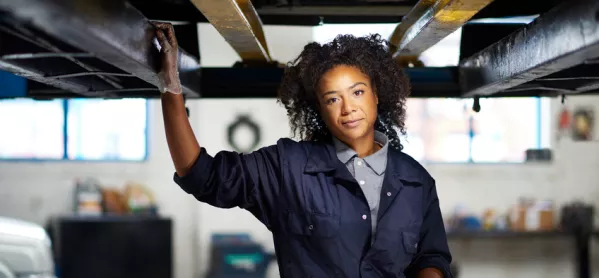- Home
- ‘Employers should reserve places for minority apprentices’
‘Employers should reserve places for minority apprentices’

Employers should take steps to get young women, people with disabilities and ethnic minorities into apprenticeships - and even favour them over other, similarly qualified candidates, according to the Equality and Human Rights Commission.
The commission said employers should reserve places on apprenticeship schemes for people from minority groups. At present, almost 90 per cent of 16- to 24-year-old apprentices are white, and women are underrepresented in particular in schemes in industries with higher salaries.
More on this: Female apprentices ‘get less money’
Background: Just 1 in 10 Stem apprentices female, report finds
Read more: National Apprenticeship Week 2019: Need to know
Using your powers
Few employers were making use of their powers under the 2010 Equality Act to tackle disadvantage and under-representation experienced by certain groups, according to a report by the commission, the University of Chester and the Young Women’s Trust.
“We need a level playing field in the workplace for women, disabled people and ethnic minorities,” Rebecca Hilsenrath, the chief executive of the Equality and Human Rights Commission told the Guardian. “If we can do this at the point of entry to the labour market, we will take giant steps towards closing pay gaps and eliminate the outdated idea that certain kinds of people ought to be doing certain kinds of jobs.”
The commission warns businesses “are hesitant about using positive action because they’re worried about inadvertently discriminating against others. “Employers need to take a confident and pro-active approach if they are really going to make a difference here,” Ms Hilsenrath said, adding that “when used correctly, positive action is a powerful way for employers to address skills shortages and foster inclusive and diverse working environments that allow everyone to reach their full potential”.
Pay differential
Sue Husband, director of the National Apprenticeship Service, has previously said apprenticeship applicants from minority backgrounds were less likely to be picked than their white counterparts. She said last year: “It cannot be right in this day and age that BAME individuals in England are, overall, less likely to be successful in their apprenticeship applications than their white counterparts. Yet sadly this is what the statistics do show. It is critical that we capture the talent of individuals from all backgrounds, and proactively work to remove any barriers that do exist.”
Research published last year by the Centre for Vocational Education Research (CVER) showed men were more likely to earn more after starting an apprenticeship than women. It concluded that for men, the pay differential from doing an apprenticeship was “very high on average, especially for advanced apprenticeships”. For women, the differential was roughly half the size and “especially modest for advanced apprenticeships by the age of 28”.
And last June, the Commons Public Accounts Committee said government departments were not making sufficient progress in addressing the gender imbalance in many areas of Stem (science, technology, engineering and maths) learning and work including apprenticeships.
General employment practices
Mark Dawe, chief executive at the Association of Employment and Learning Providers, said: “An apprenticeship is a job and what this reflects is more about individual sectors and their employment practices than apprenticeships themselves. I don’t think we should be positively discriminating for apprentices and not do it for the entire workforce. We need to focus on the employers to ensure an equal focus on the entire workforce.”
He added: “What is important is equal access. There are hidden barriers in the sense that if you see a male or female dominated workforce, you are less likely to go for an apprenticeship in that field. I am a big believer in the power of great role models, both in terms of showing employers what potential is there and showing young people the opportunities.”
Keep reading for just £1 per month
You've reached your limit of free articles this month. Subscribe for £1 per month for three months and get:
- Unlimited access to all Tes magazine content
- Exclusive subscriber-only stories
- Award-winning email newsletters



